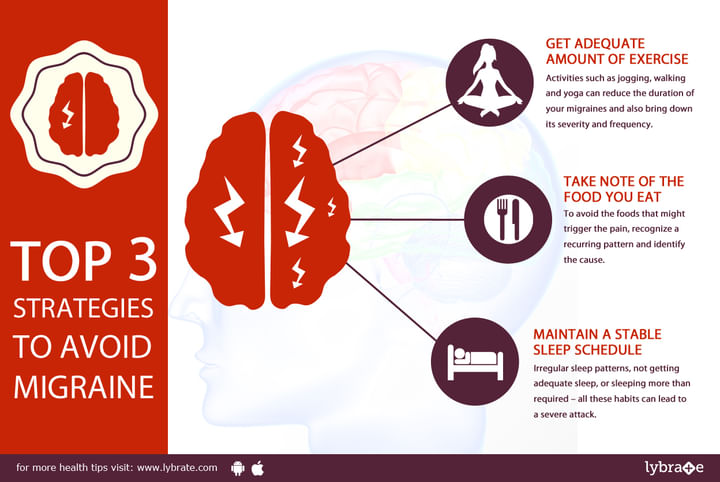Get the App
For Doctors
Login/Sign-up
Last Updated: Aug 29, 2019
BookMark
Report
Top 3 Strategies To Keep Migraine At Bay
Every person suffering from migraine will agree that - although medications can control the head-piercing pain that each attack brings with it, preventing the onset of the pain altogether is the best way to deal with it. Follow these three simple strategies and based on the reaction of your body to these, mould your lifestyle to effectively prevent the occurrence of migraine to a good extent.
1. Get adequate amount of exercise
A large majority of people who suffer from migraine steer clear of any highly intensive or strenuous exercise as it is known to be the prime trigger for a severe attack. Having said that, avoiding physical activity altogether can worsen your migraines and thus you should focus on indulging in some light exercises. Activities such as jogging, walking and yoga can reduce the duration of your migraines and also bring down its severity and frequency. Moreover, regular exercise brings down stress levels which are also a major factor for triggering migraine attacks.
2. Take note of your meal schedule and type of food that precipitates headache
For most patients migraine is triggerred by irregular meal schedule and some foods acts as triggers for migraine like cheese, chocolate, chinese foods. It is very imprtant to maintain a regular meal schedule, avoid skipping meals and take note of the items that precipitate your headache. Items that can precipitate headache is different for every individual and maitaining a headache diary can help you to identify these triggers. Also, note down the occurrence of your migraines, their duration and severity. Having adequate data makes it extremely simple to recognize a recurring pattern and leads you to the main cause behind your migraine attacks.
3. Maintain a stable sleep schedule
Sleep plays a great role in triggering migraine attacks and irregular sleep patterns, not getting adequate sleep, or sleeping more than required – all these habits can lead to a severe attack. Thus, try and create a sleep schedule for yourself keeping your daily routines in mind and follow it without fail.
1. Get adequate amount of exercise
A large majority of people who suffer from migraine steer clear of any highly intensive or strenuous exercise as it is known to be the prime trigger for a severe attack. Having said that, avoiding physical activity altogether can worsen your migraines and thus you should focus on indulging in some light exercises. Activities such as jogging, walking and yoga can reduce the duration of your migraines and also bring down its severity and frequency. Moreover, regular exercise brings down stress levels which are also a major factor for triggering migraine attacks.
2. Take note of your meal schedule and type of food that precipitates headache
For most patients migraine is triggerred by irregular meal schedule and some foods acts as triggers for migraine like cheese, chocolate, chinese foods. It is very imprtant to maintain a regular meal schedule, avoid skipping meals and take note of the items that precipitate your headache. Items that can precipitate headache is different for every individual and maitaining a headache diary can help you to identify these triggers. Also, note down the occurrence of your migraines, their duration and severity. Having adequate data makes it extremely simple to recognize a recurring pattern and leads you to the main cause behind your migraine attacks.
3. Maintain a stable sleep schedule
Sleep plays a great role in triggering migraine attacks and irregular sleep patterns, not getting adequate sleep, or sleeping more than required – all these habits can lead to a severe attack. Thus, try and create a sleep schedule for yourself keeping your daily routines in mind and follow it without fail.



+1.svg)
